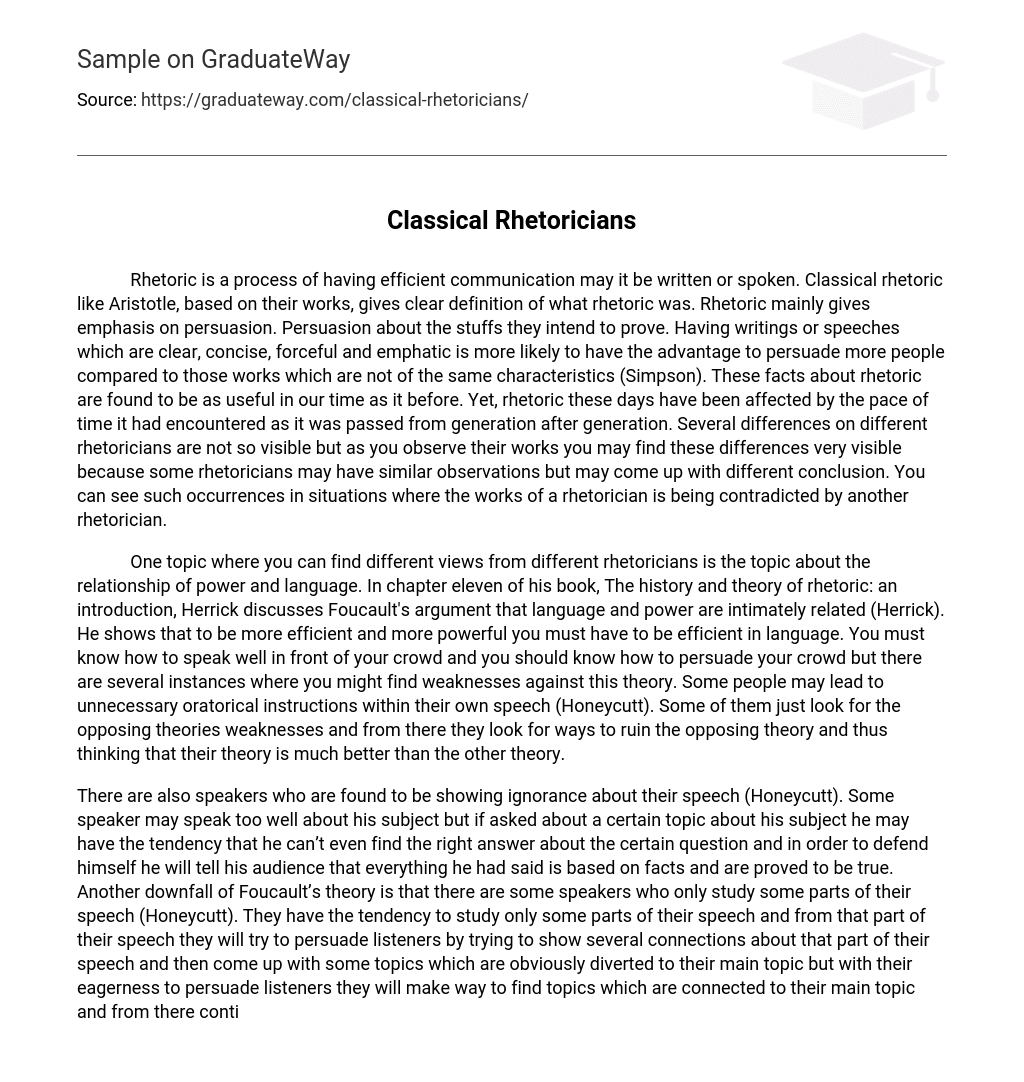Rhetoric is a process of having efficient communication may it be written or spoken. Classical rhetoric like Aristotle, based on their works, gives clear definition of what rhetoric was. Rhetoric mainly gives emphasis on persuasion. Persuasion about the stuffs they intend to prove. Having writings or speeches which are clear, concise, forceful and emphatic is more likely to have the advantage to persuade more people compared to those works which are not of the same characteristics (Simpson). These facts about rhetoric are found to be as useful in our time as it before. Yet, rhetoric these days have been affected by the pace of time it had encountered as it was passed from generation after generation. Several differences on different rhetoricians are not so visible but as you observe their works you may find these differences very visible because some rhetoricians may have similar observations but may come up with different conclusion. You can see such occurrences in situations where the works of a rhetorician is being contradicted by another rhetorician.
One topic where you can find different views from different rhetoricians is the topic about the relationship of power and language. In chapter eleven of his book, The history and theory of rhetoric: an introduction, Herrick discusses Foucault’s argument that language and power are intimately related (Herrick). He shows that to be more efficient and more powerful you must have to be efficient in language. You must know how to speak well in front of your crowd and you should know how to persuade your crowd but there are several instances where you might find weaknesses against this theory. Some people may lead to unnecessary oratorical instructions within their own speech (Honeycutt). Some of them just look for the opposing theories weaknesses and from there they look for ways to ruin the opposing theory and thus thinking that their theory is much better than the other theory.
There are also speakers who are found to be showing ignorance about their speech (Honeycutt). Some speaker may speak too well about his subject but if asked about a certain topic about his subject he may have the tendency that he can’t even find the right answer about the certain question and in order to defend himself he will tell his audience that everything he had said is based on facts and are proved to be true. Another downfall of Foucault’s theory is that there are some speakers who only study some parts of their speech (Honeycutt). They have the tendency to study only some parts of their speech and from that part of their speech they will try to persuade listeners by trying to show several connections about that part of their speech and then come up with some topics which are obviously diverted to their main topic but with their eagerness to persuade listeners they will make way to find topics which are connected to their main topic and from there continues the process until they find the key to where they could have the higher chance of persuading the audience.
From the several cited examples, though both point of views and teories have been affected by time and generations that has passed by, we can see that Quintilian’s point of view and theories are much worthy of use because with his theory you will persuade your audience based on facts, experience can be another source and even close to reality observations and not just based on your ability ti speak and your ability to think of way of defending your speech as what is shown on Foucault’s theory.
Herrick, James A. The History and Theory of Rhetoric: An Introduction. 3rd edition ed: addison-wesley, 2004.
Honeycutt, Lee. “Quintillan’s Institute of Oratory”. 2004. April 25 2007. <http://honeyl.public.iastate.edu/quintilian/2/chapter11.html>.
Simpson, David L. “Classical Rhetoric”. 2007. April 25 2007. <http://collaboratory.nunet.net/dsimpson/rhetoric.html>.





